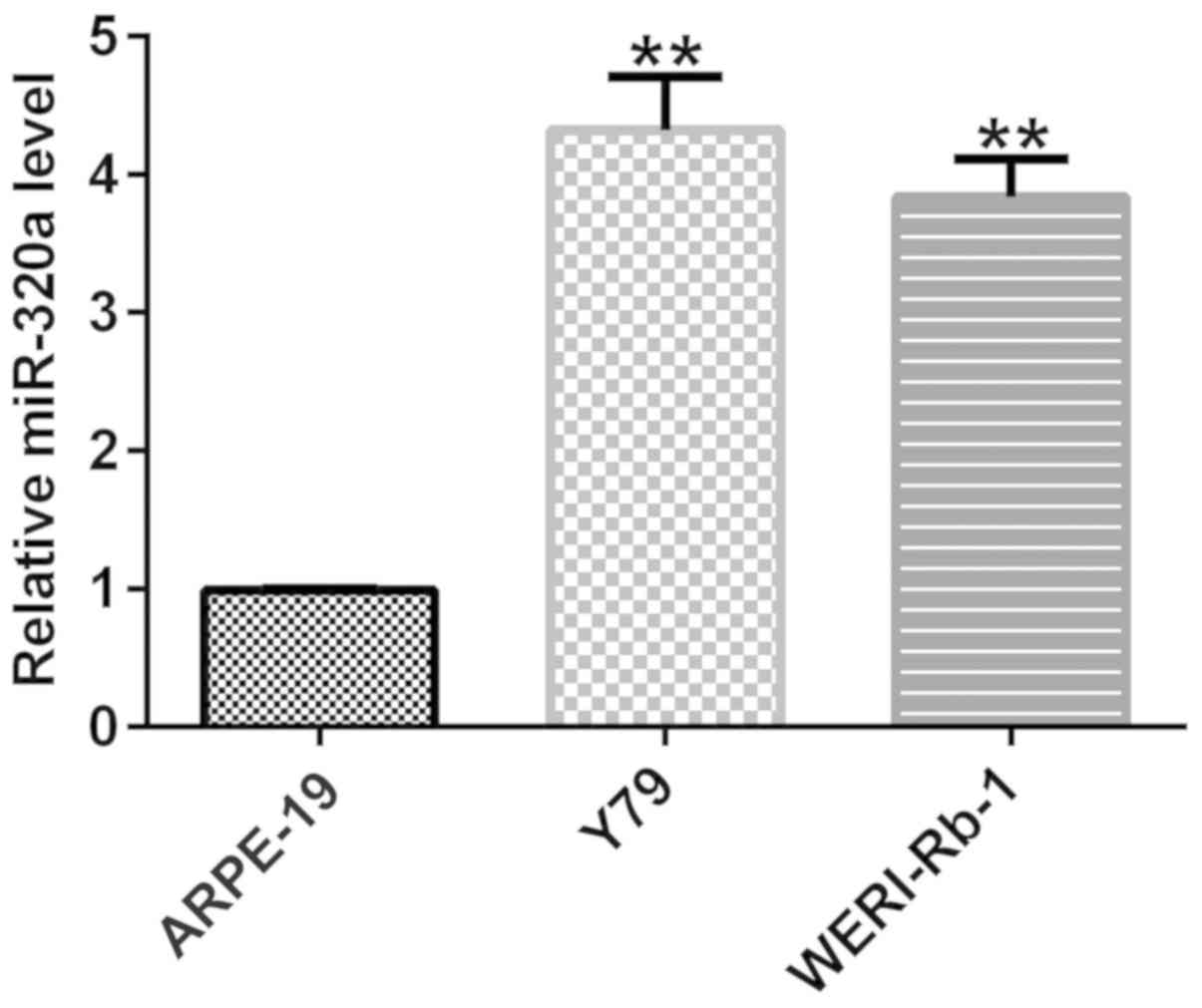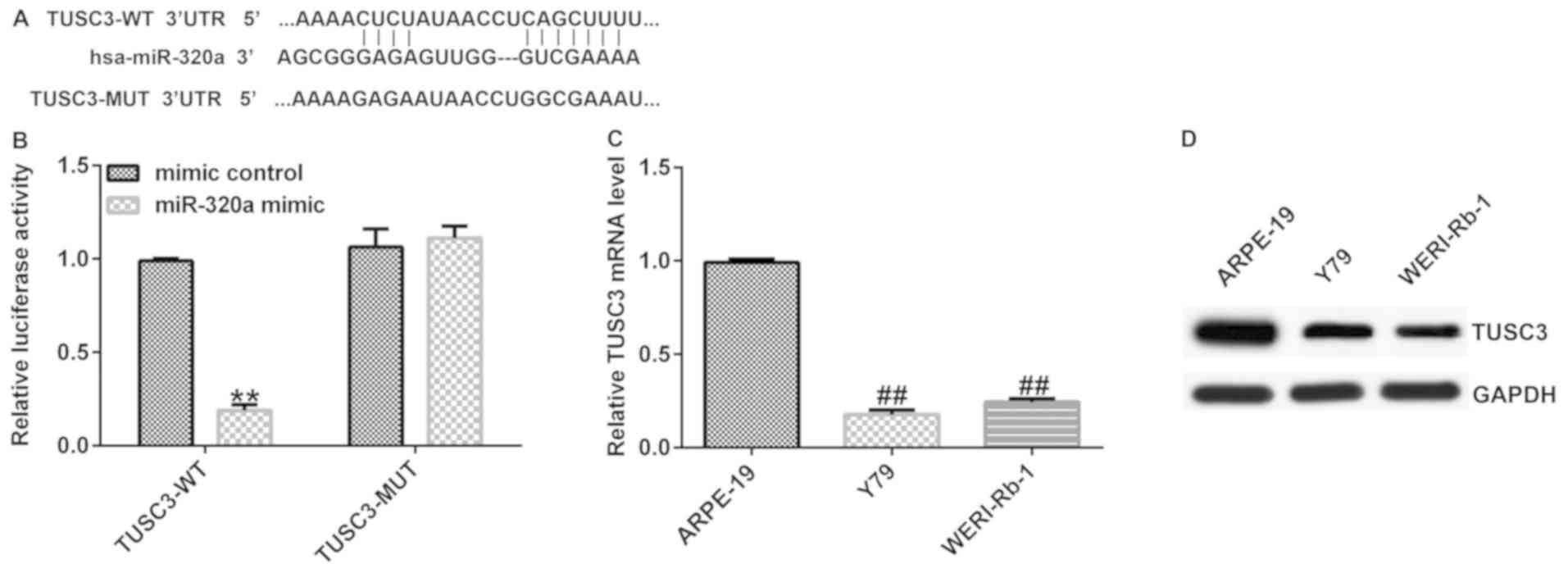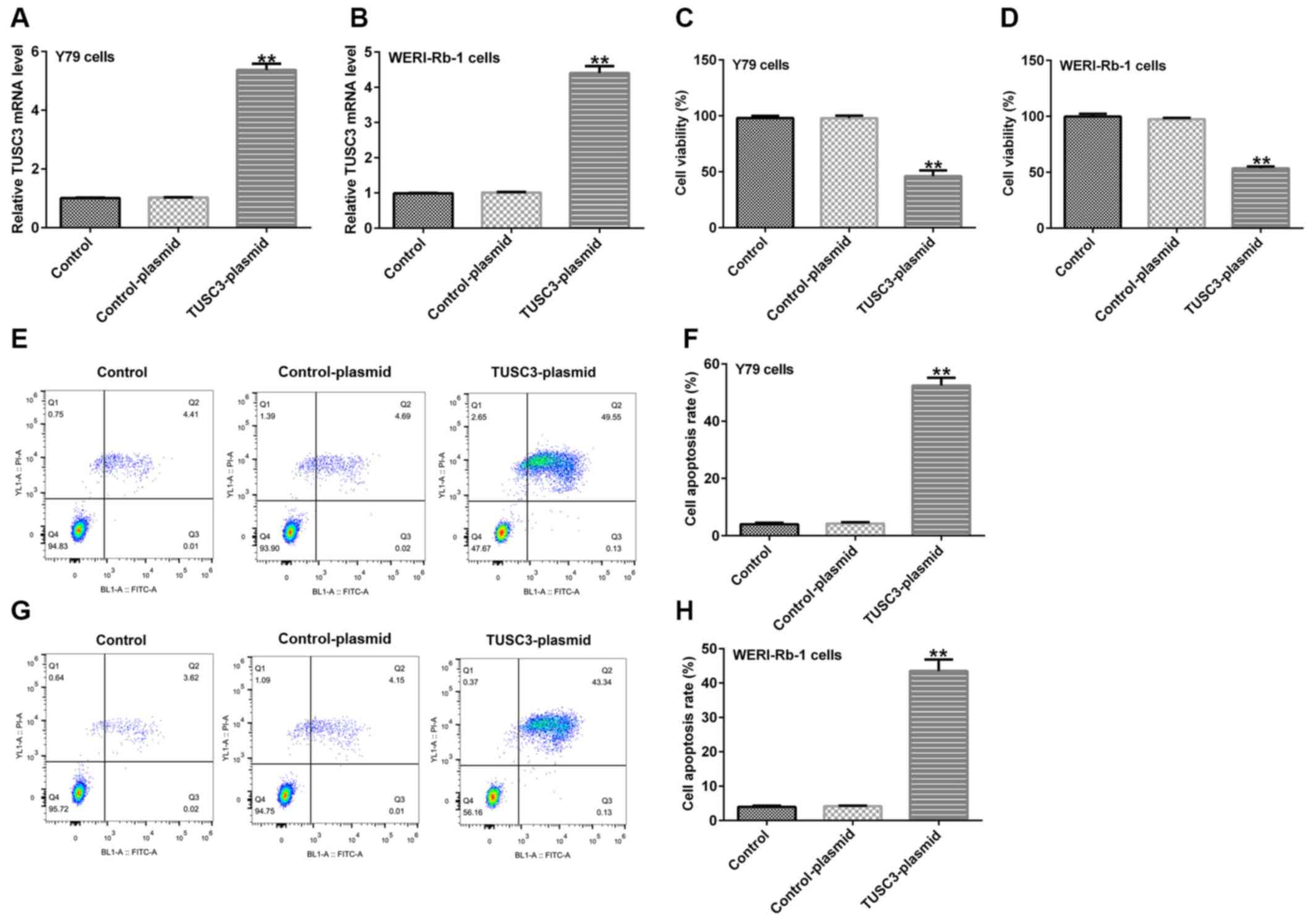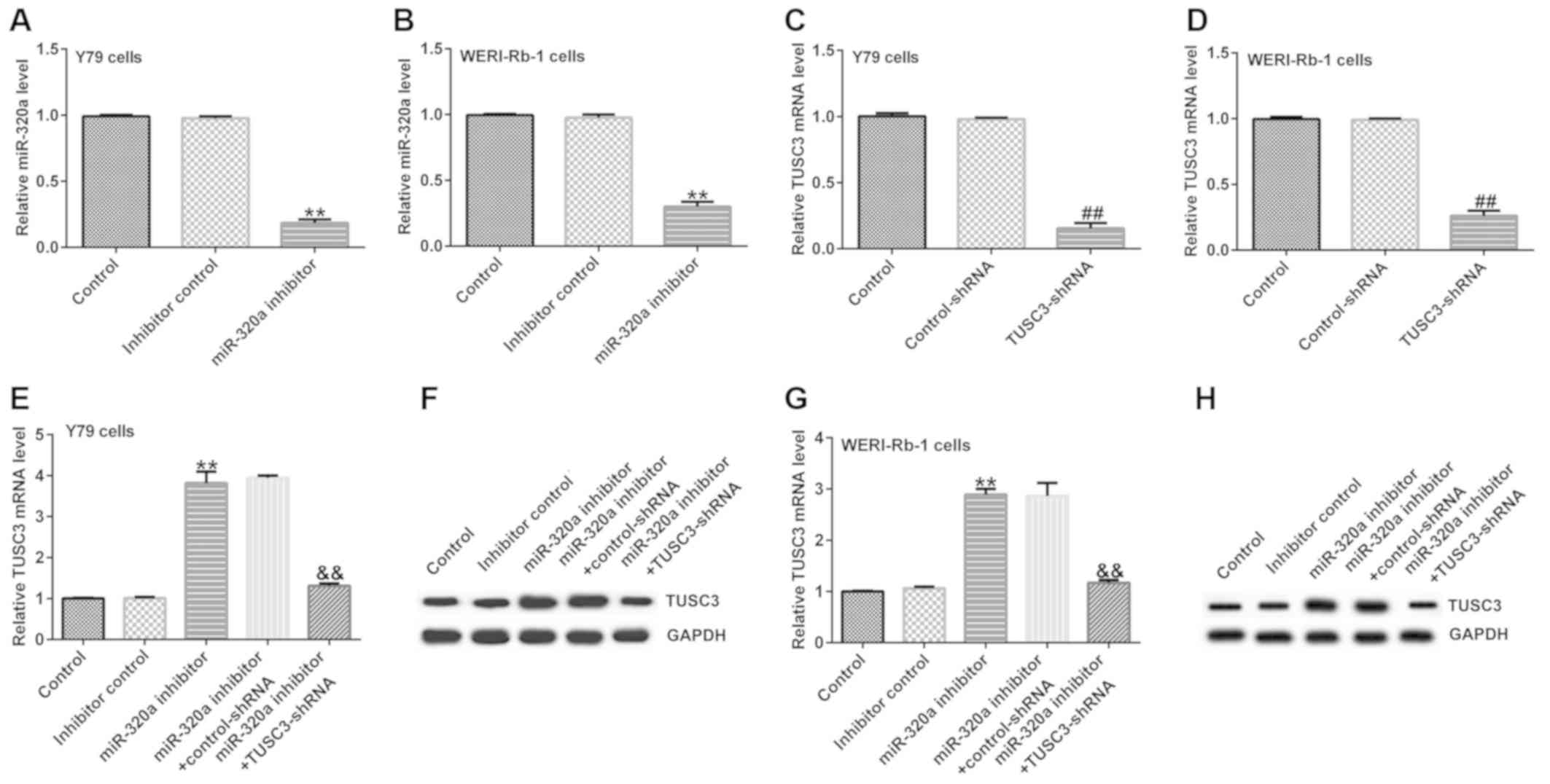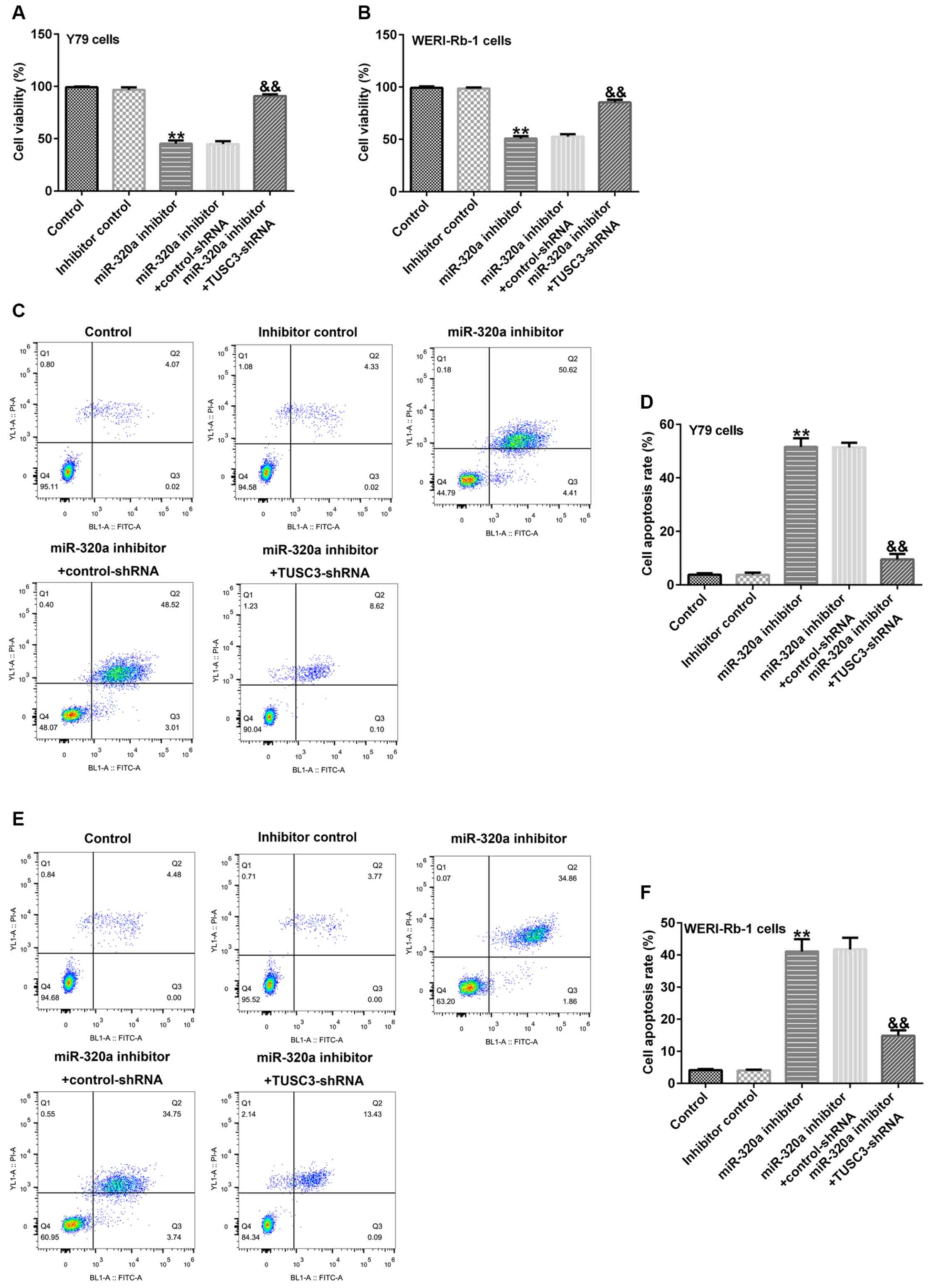|
1
|
Wong JR, Tucker MA, Kleinerman RA and
Devesa SS: Retinoblastoma incidence patterns in the US
surveillance, epidemiology, and end results program. JAMA
Ophthalmol. 132:478–483. 2014.PubMed/NCBI View Article : Google Scholar
|
|
2
|
Riquelam I, Tapia O, Leal P, Sandoval A,
Varga MG, Letelier P, Buchegger K, Bizama C, Espinoza JA, Peek RM,
et al: miR-101-2, miR-125b-2 and miR-451a act as potential tumor
suppressors in gastric cancer through regulation of the
PI3K/AKT/mTOR pathway. Cell Oncol (Dordr). 39:23–33.
2016.PubMed/NCBI View Article : Google Scholar
|
|
3
|
McEvoy JD and Dyer MA: Genetic and
epigenetic discoveries in human retinoblastoma. Crit Rev Oncog.
20:217–225. 2015.PubMed/NCBI View Article : Google Scholar
|
|
4
|
Gudiseva HV, Berry JL, Polski A, Tummina
SJ and O'Brien JM: Next-generation technologies and strategies for
the management of retinoblastoma. Genes (Basel).
10(1032)2019.PubMed/NCBI View Article : Google Scholar
|
|
5
|
Kong L, Zhang P, Li W, Yang Y, Tian Y,
Wang X, Chen S, Yang Y, Huang T, Zhao T, et al: KDM1A promotes
tumor cell invasion by silencing TIMP3 in non-small cell lung
cancer cells. Oncotarget. 7:27959–27974. 2016.PubMed/NCBI View Article : Google Scholar
|
|
6
|
Fan X, Zhang X, Shen J, Zhao H, Yu X, Chen
Y, Zhuang Z, Deng X, Feng H, Wang Y and Peng L: Decreased TUSC3
promotes pancreatic cancer proliferation, invasion and metastasis.
PLoS One. 11(e0149028)2016.PubMed/NCBI View Article : Google Scholar
|
|
7
|
Horak P, Tomasich E, Vaňhara P,
Kratochvílová K, Anees M, Marhold M, Lemberger CE, Gerschpacher M,
Horvat R, Sibilia M, et al: TUSC3 loss alters the ER stress
response and accelerates prostate cancer growth in vivo. Sci Rep.
4(3739)2014.PubMed/NCBI View Article : Google Scholar
|
|
8
|
Kratochvílová K, Horak P, Ešner M, Souček
K, Pils D, Anees M, Tomasich E, Dráfi F, Jurtíková V, Hampl A, et
al: Tumor suppressor candidate 3 (TUSC3) prevents the
epithelial-to-mesenchymal transition and inhibits tumor growth by
modulating the endoplasmic reticulum stress response in ovarian
cancer cells. Int J Cancer. 137:1330–1340. 2015.PubMed/NCBI View Article : Google Scholar
|
|
9
|
Li P, Zheng X, Shou K, Niu Y, Jian C, Zhao
Y, Yi W, Hu X and Yu A: The iron chelator Dp44mT suppresses
osteosarcoma's proliferation, invasion and migration: In vitro and
in vivo. Am J Transl Res. 8:5370–5385. 2016.PubMed/NCBI
|
|
10
|
Li YG, Liang NX, Qin YZ, Ma DJ, Huang CJ,
Liu L and Li SQ: Effects of RNAi-mediated TUSC3 silencing on
radiation-induced autophagy and radiation sensitivity of human lung
adenocarcinoma cell line A549 under hypoxic condition. Tumour Biol.
37:16357–16365. 2016.PubMed/NCBI View Article : Google Scholar
|
|
11
|
Ohno Y, Koyama H, Yoshikawa T, Takenaka D,
Seki S, Yui M, Yamagata H, Aoyagi K, Matsumoto S and Sugimura K:
Three-way comparison of whole-body MR, coregistered whole-body FDG
PET/MR, and Integrated whole-body FDG PET/CT imaging: TNM and stage
assessment capability for non-small cell lung cancer patients.
Radiology. 275:849–861. 2015.PubMed/NCBI View Article : Google Scholar
|
|
12
|
Scagliotti G, Kang JH, Smith D, Rosenberg
R, Park K, Kim SW, Su WC, Boyd TE, Richards DA, Novello S, et al:
Phase II evaluation of LY2603618, a first-generation CHK1
inhibitor, in combination with pemetrexed in patients with advanced
or metastatic non-small cell lung cancer. Invest New Drugs.
34:625–635. 2016.PubMed/NCBI View Article : Google Scholar
|
|
13
|
Chung KW and Kim SW and Kim SW: Gene
expression profiling of papillary thyroid carcinomas in Korean
patients by oligonucleotide microarrays. J Korean Surg Soc.
82:271–280. 2012.PubMed/NCBI View Article : Google Scholar
|
|
14
|
Yang L, Chen Y, Cui T, Knösel T, Zhang Q,
Albring KF, Huber O and Petersen I: Desmoplakin acts as a tumor
suppressor by inhibition of the Wnt/β-catenin signaling pathway in
human lung cancer. Carcinogenesis. 33:1863–1870. 2012.PubMed/NCBI View Article : Google Scholar
|
|
15
|
Yu X, Zhai C, Fan Y, Zhang J, Liang N, Liu
F, Cao L, Wang J and Du J: TUSC3: A novel tumour suppressor gene
and its functional implications. J Cell Mol Med. 21:1711–1718.
2017.PubMed/NCBI View Article : Google Scholar
|
|
16
|
Pils D, Horak P, Vanhara P, Anees M, Petz
M, Alfanz A, Gugerell A, Wittinger M, Gleiss A, Auner V, et al:
Methylation status of TUSC3 is a prognostic factor in ovarian
cancer. Cancer. 119:946–954. 2013.PubMed/NCBI View Article : Google Scholar
|
|
17
|
Zhao Y, Schetter AJ, Yang GB, Nguyen G,
Mathé EA, Li P, Cai H, Yu L, Liu F, Hang D, et al: microRNA and
inflammatory gene expression as prognostic marker for overall
survival in esophageal squamous cell carcinoma. Int J Cancer.
132:2901–2909. 2013.PubMed/NCBI View Article : Google Scholar
|
|
18
|
Li Q, Yokoshi M, Okada H and Kawahara Y:
The cleavage pattern of TDP-43 determines its rate of clearance and
cytotoxicity. Nat Commun. 6(6183)2015.PubMed/NCBI View Article : Google Scholar
|
|
19
|
Yu X, Zhang K, Liu F, Zhang J, Zhai C, Cao
L, Song X, Wang Y, Li B, Sun H and Du J: Tumor suppressor candidate
3 as a novel predictor for lymph node metastasis in lung cancer
patients. Oncol Lett. 12:5099–5105. 2016.PubMed/NCBI View Article : Google Scholar
|
|
20
|
Gu Y, Pei X, Ren Y, Cai K, Guo K, Chen J,
Qin W, Lin M, Wang Q, Tang N, et al: Oncogenic function of TUSC3 in
non-small cell lung cancer is associated with Hedgehog signalling
pathway. Biochim Biophys Acta Mol Basis Dis. 1863:1749–1760.
2017.PubMed/NCBI View Article : Google Scholar
|
|
21
|
Yuan J, Yu X, Wang A, Li Y, Liu F, Wang Y,
Sun S, Bing X, Liu Y and Du J: Tumor suppressor candidate 3: A
novel grading tool and predictor of clinical malignancy in human
gliomas. Oncol Lett. 15:5655–5661. 2018.PubMed/NCBI View Article : Google Scholar
|
|
22
|
Duppel U, Woenckhaus M, Schulz C, Merk J
and Dietmaier W: Quantitative detection of TUSC3 promoter
methylation-a potential biomarker for prognosis in lung cancer.
Oncol Lett. 12:3004–3012. 2016.PubMed/NCBI View Article : Google Scholar
|
|
23
|
Bartel DP: MicroRNAs: Genomics,
biogenesis, mechanism, and function. Cell. 116:281–297.
2004.PubMed/NCBI View Article : Google Scholar
|
|
24
|
Hammond SM: An overview of microRNAs. Adv
Drug Deliv Rev. 87:3–14. 2015.PubMed/NCBI View Article : Google Scholar
|
|
25
|
Ghildiyal M and Zamore PD: Small silencing
RNAs: An expanding universe. Nat Rev Genet. 10:94–108.
2009.PubMed/NCBI View
Article : Google Scholar
|
|
26
|
Soifer HS, Rossi JJ and Saetrom P:
MicroRNAs in disease and potential therapeutic applications. Mol
Ther. 15:2070–2079. 2017.PubMed/NCBI View Article : Google Scholar
|
|
27
|
Krol J, Loedige I and Filipowicz W: The
widespread regulation of microRNA biogenesis, function and decay.
Nat Rev Genet. 11:597–610. 2010.PubMed/NCBI View
Article : Google Scholar
|
|
28
|
O'Connell RM, Rao DS, Chaudhuri AA and
Baltimore D: Physiological and pathological roles for microRNAs in
the immune system. Nat Rev Immunol. 10:111–122. 2010.PubMed/NCBI View
Article : Google Scholar
|
|
29
|
Qadir MI and Faheem A: miRNA: A diagnostic
and therapeutic tool for pancreatic cancer. Crit Rev Eukaryot Gene
Expr. 27:197–204. 2017.PubMed/NCBI View Article : Google Scholar
|
|
30
|
Tutar Y: miRNA and cancer; computational
and experimental approaches. Curr Pharm Biotechnol.
15(429)2014.PubMed/NCBI View Article : Google Scholar
|
|
31
|
Prado MSG, de Jesus ML, de Goes TC,
Mendonça LSO and Kaneto CM: Downregulation of circulating miR-320a
and target gene prediction in patients with diabetic retinopathy.
BMC Res Notes. 13(155)2020.PubMed/NCBI View Article : Google Scholar
|
|
32
|
Zhang C, Yang H, Li Y, Huo P and Ma P:
LNCRNA OIP5-AS1 regulates oxidative low-density
lipoprotein-mediated endothelial cell injury via miR-320a/LOX1
axis. Mol Cell Biochem. 467:15–25. 2020.PubMed/NCBI View Article : Google Scholar
|
|
33
|
Qin H, Liu J, Du ZH, Hu R, Yu YK and Wang
QA: Circular RNA hsa_circ_0012673 facilitates lung cancer cell
proliferation and invasion via miR-320a/LIMK18521 axis. Eur Rev Med
Pharmacol Sci. 24:1841–1852. 2020.PubMed/NCBI View Article : Google Scholar
|
|
34
|
Li M, Qu L, Chen F and Zhu X: Propofol
upregulates miR-320a and reduces HMGB1 by downregulating ANRIL to
inhibit PTC cell malignant behaviors. Pathol Res Pract.
216(152856)2020.PubMed/NCBI View Article : Google Scholar
|
|
35
|
Wang Y, Yang J, Chen P, Song Y, An W,
Zhang H, Butegeleqi B and Yan J: MicroRNA-320a inhibits invasion
and metastasis in osteosarcoma by targeting cytoplasmic
polyadenylation element-binding protein 1. Cancer Med. 9:2833–2845.
2020.PubMed/NCBI View Article : Google Scholar
|
|
36
|
Wu S, Chen S, Lin N and Yang J: Long
non-coding RNA SUMO1P3 promotes hepatocellular carcinoma
progression through activating Wnt/β-catenin signalling pathway by
targeting miR-320a. J Cell Mol Med. 24:3108–3116. 2020.PubMed/NCBI View Article : Google Scholar
|
|
37
|
Zhao JJ, Yang J, Lin J, Yao N, Zhu Y,
Zheng J, Xu J, Cheng JQ, Lin JY and Ma X: Identification of miRNAs
associated with tumorigenesis of retinoblastoma by miRNA microarray
analysis. Childs Nerv Syst. 25:13–20. 2009.PubMed/NCBI View Article : Google Scholar
|
|
38
|
Livak KJ and Schmittgen TD: Analysis of
relative gene expression data using real-time quantitative PCR and
the 2(-Delta Delta C(T)) method. Methods. 25:402–408.
2001.PubMed/NCBI View Article : Google Scholar
|
|
39
|
Zhong Y, Zhao M, Yu Y, Li Q, Wang F, Wu P,
Zhang W and Miao L: Prognostic value and therapeutic potential of
the long noncoding RNA TP73-AS1 in cancers: A systematic review and
meta-analysis. Sci Rep. 10(9053)2020.PubMed/NCBI View Article : Google Scholar
|
|
40
|
Morris LG and Chan TA: Therapeutic
targeting of tumor suppressor genes. Cancer. 121:1357–1368.
2015.PubMed/NCBI View Article : Google Scholar
|
|
41
|
Yang Y and Mei Q: miRNA signature
identification of retinoblastoma and the correlations between
differentially expressed miRNAs during retinoblastoma progression.
Mol Vis. 21:1307–1317. 2015.PubMed/NCBI
|
|
42
|
Castro-Magdonel BE, Orjuela M, Camacho J,
García-Chéquer AJ, Cabrera-Muñoz L, Sadowinski-Pine S,
Durán-Figueroa N, Orozco-Romero MJ, Velázquez-Wong AC,
Hernández-Ángeles A, et al: miRNome landscape analysis reveals a 30
miRNA core in retinoblastoma. BMC Cancer. 17(458)2017.PubMed/NCBI View Article : Google Scholar
|
|
43
|
Svoronos AA, Engelman DM and Slack FJ:
OncomiR or tumor suppressor? The duplicity of MicroRNAs in cancer.
Cancer Res. 76:3666–3670. 2016.PubMed/NCBI View Article : Google Scholar
|
|
44
|
Gao T, Deng M and Wang Q: MiRNA-320a
inhibits trophoblast cell invasion by targeting estrogen-related
receptor-gamma. J Obstet Gynaecol Res. 44:756–763. 2018.PubMed/NCBI View Article : Google Scholar
|
|
45
|
Yong S, Yabin Y, Bing Z, Chuanrong Z,
Dianhua G, Jianhuai Z, Weidong Y, Shuming W and Ling L: Reciprocal
regulation of DGCR5 and miR-320a affects the cellular malignant
phenotype and 5-FU response in pancreatic ductal adenocarcinoma.
Oncotarget. 8:90868–90878. 2017.PubMed/NCBI View Article : Google Scholar
|















